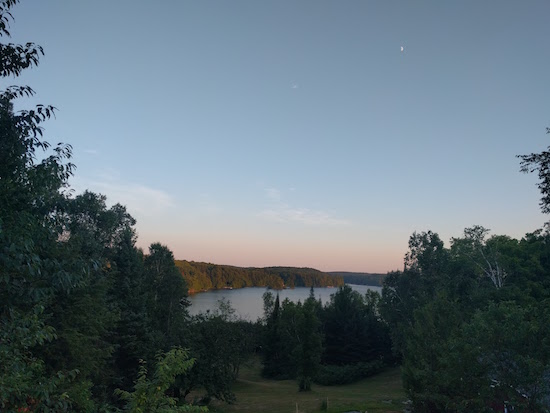August 31, 2016
Extraordinary Day
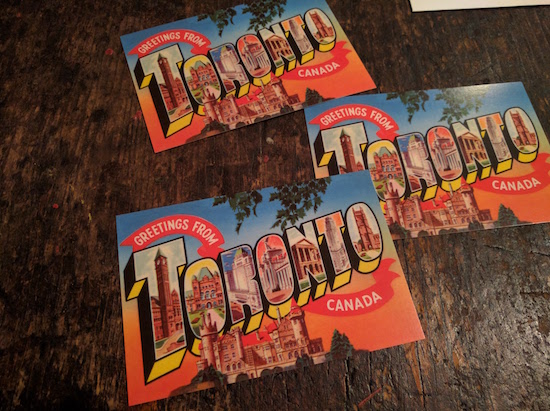
My favourite thing about being a parent is the way you get the make the world magic. The way you can wave an imaginary wand an transform an ordinary day into a extraordinary one. The way that my children had no idea what was up when we told them to get their shoes on at 8:30 this morning, and when they kept asking where we were going, we said they’d find out when they got there. They’d been expecting their daddy to leave for work as usual, but there we all were marching to the subway, south to Union. And then a walk along Front Street, and over the train tracks to the aquarium, because Harriet’s loves the aquarium, and had expressed a wish to go there again. There you go Harriet: wish granted. Amazing.

We had a terrific time at the aquarium, and the best part was when we ran into my best friend Jennie. After a few hours we were done though, and the place was completely bonkers, and so we left and meandered north to the place that had perhaps inspired this whole aquarium plan—the close-in-proximity, brand new Penguin Bookshop.
A bookstore that fits in your pocket, it is, or your closet, at least. Formerly a shoe repair kiosk. It features a lively selection of Penguin-branded goods and books they publish, Canadian and classic. I got the new Dave Eggers novel and The Bloody Chamber, by Angela Carter, and we bought a copy of Ooko because we’d had it from the library and loved it. It was very nice to finally stop by.
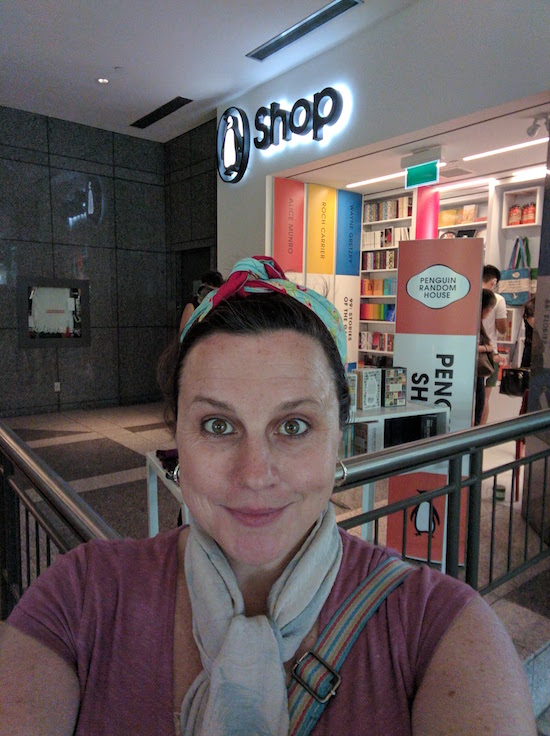
We had lunch at the Old Spaghetti Factory, which was completely fun, and totally not horrible or boring. And there was so much bread. The bad thing about being snobs who live downtown is that we don’t get free bread with our meals very often, and certainly not for lunch (and if we do, it’s spelt bread and nobody wants to eat it). The children thought the place was great and we thought it was surprisingly good, the perfect place to stop on this day of being tourists in our own city for a while.
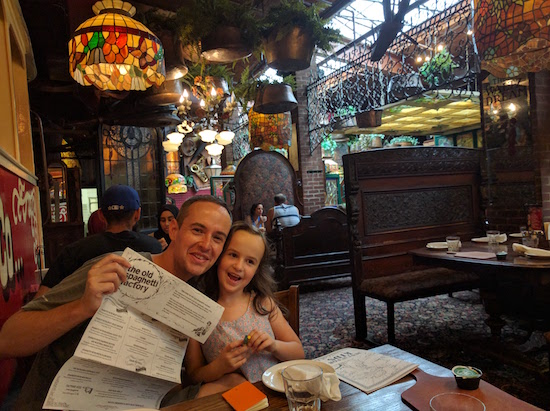
“And what are you doing with the rest of your day?” our waiter asked us as we paid our bill. “We’re going to visit Toronto’s First Post Office,” I told him. I told him, “You’ve probably been there a hundred times, right?” He gave me a look. When he finally bid us adieu, he said, “Have fun at the…post office.”
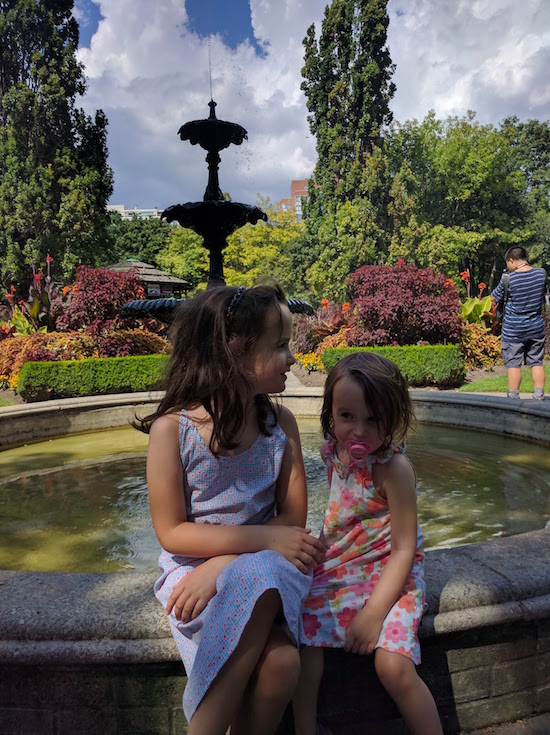
But not just any post office! It’s an actual working post office (and woo hoo! Canada Post and its employees have finally come to an agreement so we’re not going to be having a postal strike) AND a museum. From the restaurant, we walked through the beautiful St. Lawrence neighbourhood to get there, and finally arrived. Full disclosure, the children were being to lose their shit by this point.
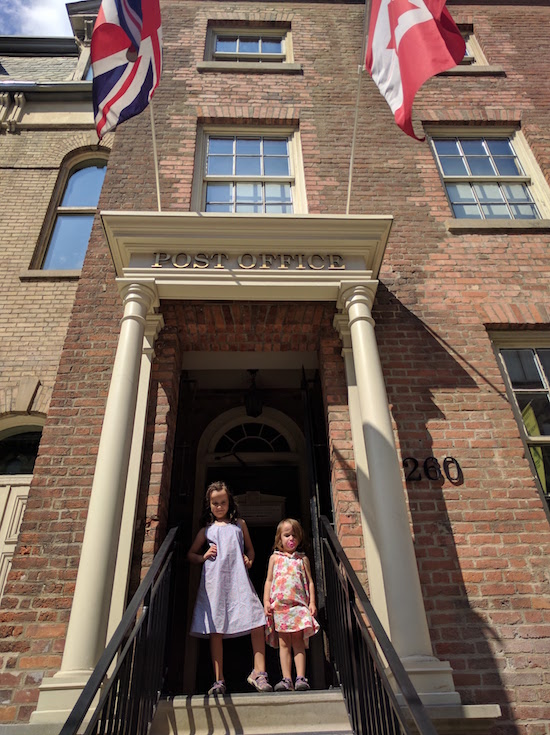
At Toronto’s First Post office you get to try writing with quills, and can also purchase stationary to write letters in their reading room. The place was marvellously busy, with tourists and also people coming in on ordinary errands. After finding out that writing with quills was really hard, Harriet and Iris sat down to write with ordinary pens, and they both ended up crying because a) over the summer Harriet had lost any writing skills she’d ever possessed and b) Iris had never possessed any anyway. And all I wanted to was write a letter to my friend, but the children were bananas and also doing dangerous deeds with ink, which ended up smeared all over Iris’s body, and then she blotted it with the sand provided for such things, and it all had gone a little bit awry. We pulled it together though, got letters written and even posted. And then it was time to admit that the day was coming to an end, so we headed for the subway, and nobody cried again, I think, so it all was a success.
August 30, 2016
Mister Nightingale, by Paul Bowdring
 In my friend Mark Sampson’s review of Paul Bowering’s last novel, the award-winning The Stranger’s Gallery in The Fiddlehead, he wrote, “Bowdring’s prose bursts with such clarity and assuredness that you trust his voice to take you anywhere it wants…” I know this because this excerpt from Mark’s review appears inside the ARC for Bowering’s latest novel, Mister Nightingale, and when I read that line, I thought, “Exactly.” Because while the notion of Bowdring’s novel as a “novelist’s novel” appeals to me—I love his send-up of literary culture, of small press politics, of comradeship and competition between writers, and all of that insider baseball—Mister Nightingale isn’t the kind of book I can manage to get through. And not just because it’s written by a man (she writes, unabashedly wearing her bias on her sleeve), because it’s about a man whose own literary bedrock is so definitively male. It’s all Kafka and his frozen heart, and James Joyce, and Proust, and all those people I’ve never read and never will because so many other people read them already that I don’t have to. Because I don’t trust any writer who doesn’t have a single literary foremother, or at least ten of them, and Bowdring’s James Nightingale never references one.
In my friend Mark Sampson’s review of Paul Bowering’s last novel, the award-winning The Stranger’s Gallery in The Fiddlehead, he wrote, “Bowdring’s prose bursts with such clarity and assuredness that you trust his voice to take you anywhere it wants…” I know this because this excerpt from Mark’s review appears inside the ARC for Bowering’s latest novel, Mister Nightingale, and when I read that line, I thought, “Exactly.” Because while the notion of Bowdring’s novel as a “novelist’s novel” appeals to me—I love his send-up of literary culture, of small press politics, of comradeship and competition between writers, and all of that insider baseball—Mister Nightingale isn’t the kind of book I can manage to get through. And not just because it’s written by a man (she writes, unabashedly wearing her bias on her sleeve), because it’s about a man whose own literary bedrock is so definitively male. It’s all Kafka and his frozen heart, and James Joyce, and Proust, and all those people I’ve never read and never will because so many other people read them already that I don’t have to. Because I don’t trust any writer who doesn’t have a single literary foremother, or at least ten of them, and Bowdring’s James Nightingale never references one.
And yet, there was something about the narrative. While in most books, the lack of foremothers would be off-putting, I was willing to forgive it of Mister Nightingale. Because of what Mark wrote about the clarity and assuredness of Bowdring’s prose that I trusted enough to follow. Because (and I am not kidding, this is usually a deal breaker for me): in the entire book, there is not a single blowjob (and this is another reason why I tend to avoid books by men. Ubiquitous blowjobs. They go on for paragraphs and paragraphs. It’s really quite unbearable). And because there was this strange and uncanny echo in the novel of Carol Shields’ Unless, and I’m not saying this was anymore than me making weird connections, but they were vivid ones. James Nightingale, like Reta Winters, a semi-successful novelist, belying the ordinary lives and concerns behind the writer’s persona. James’ estranged wife is called Alicia, who plays viola in an orchestra, although in Reta Winters’ fictional novel, her heroine Alicia is engaged to a man who plays trombone in an orchestra, and so the lines aren’t exactly parallel, but still, one reminds me of the other. Mister Nightingale raises the question of unlived lives, as does Unless and also Shields’ The Stone Diaries, James considering the experiences of his neighbour who discovers her freedom and possibilities when her husband dies and her children are grown, and he also considers his own lives, the ones he might have lived, had he made other choices. Both characters also deal with the demands of elderly parents, and the peculiar, tangled nature of relationships with daughters on the cusp of womanhood. In many ways, these books are spiritual siblings. I think they’d get along.
Mister Nightingale begins with James’ return to his native Newfoundland after 30 years away. He’s even missed his own mother’s funeral, but now they’re offering him an honorary degree, and a local press is reissuing his first book. Plus his marriage has ended in Toronto and he doesn’t know what he’s going to do next, so it seems like a good time to return to the scene of the crime. The crime being the small press publisher ripping off James’ friend, the poet, Kevin, who didn’t get paid for sales of his book and who was furious to discover his poetry published in a high school English text and he hadn’t been paid for that either. So naturally, things are going to get more than a bit interesting at James’ book launch (although the date for that event is being postponed over and over again, in absolutely true small press fashion).
But in the meantime, James takes stock of his life, tries to reconnect with his father, encounters ghosts from his past, learns all the ways that Newfoundland has changed and stayed the same in the last three decades, and keeps some tabs on his daughter, who has just started university in St. John’s. He becomes reacquainted with his sister, gets a Newfoundland driver’s licence, partakes in an ill-attended book signing at the local Chapters, and gets drunk on local TV.
All of which is to say that the novel is not terrible plot-driven, but we go there anyway, with pleasure even, for all the reasons recounted above. Mister Nightingale is a smart, funny and absorbing book, and I’m so glad I went along on its journey.
August 29, 2016
The Art of Blogging begins again…

My very favourite part of my blogging course is week 6ish when we talk about what blogging has to do with cake, getting lost, Maira Kalman’s The Principles of Uncertainty, and hope in the darkness. If you care to take a crash course, you can do so here, but if you feel like joining us, I’m pleased to let you know that The Art of Blogging starts on October 3 and runs until the end of November at the University of Toronto’s School of Continuing Studies. You can register now, and I do hope some of you can make it.
August 25, 2016
The Body Book, by Roz MacLean
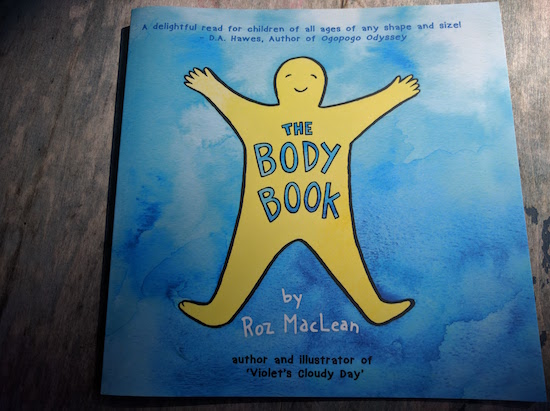
If my copy of Lindy West’s Shrill hadn’t been from the library, among the countless parts I would have underlined would have included the part where she states that she’s never actually hated her body, or felt loathing toward it, but instead was just all too aware that the rest of the world thought that it didn’t conform to its standard. Which has always been my experience, for the most part (which, full disclosure, is also fairly easy for me to say, because my body has rarely deviated very radically from the standard, and let me tell you, there were some years when my body was pretty smoking’ hot [1997 and 2007 in particular were good years; maybe it’s a decennial thing, in which I’m holding out big hopes for the forthcoming annum]).
Truth: I’m still working on losing the baby weight from my second pregnancy—if by “working on losing the baby weight” you mean “eating a lot of croissants and not giving a fuck about the baby weight.”
I’ve always aspired to be quite at home in my body. When I was 17 and wrote for a teen section in our community paper, I plagiarized an article I’d read in a teen magazine about the contentment of a girl who’s eating a McDonalds hot fudge sundae—I wanted to feel that good about myself. That I had to steal the idea though is perfectly telling.
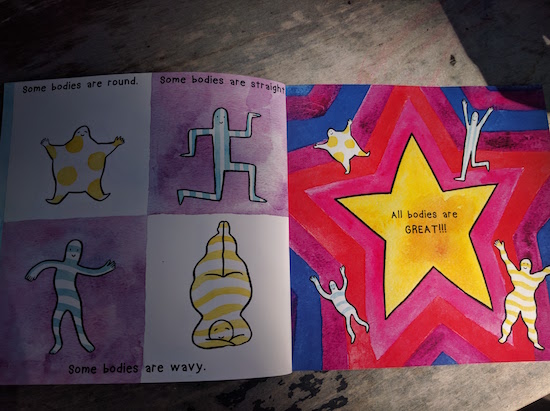
In 2001, I made my friends come with me to the nude beach at Hanlon’s Point when I stripped down to nothing and walked across a beach full of people on my way for a swim, which was truly a life-changing and empowering experience.
In 2012, I took a photograph of myself in a bathing suit and put it on the internet, which I thought was a big deal at the time (and I hadn’t even gained the baby weight!).
Last week I did the same thing again, but by now this didn’t feel remarkable. (What I wrote beside the image did though. “So glad to live in this body,” I captioned the photo, which is, in all honestly, one of the most subversive, badass things a woman can say, and what does that say about us?). And the single biggest thing that I can credit for finally attaining the self-acceptance I’ve been chasing for two decades is this one thing, or two?
I have daughters.
When I became a mother, I made several promises to myself, many of which I eventually broke (including, I will always speak kind and respectfully to my children; I will never bitch at them for reading too much [I know!—but seriously, put the book down, Harriet]; and I will never suddenly exclaim in the middle of an afternoon, “Oh my god, oh my god, all of you, now, just GO AWAY!”). But one promise I have forever stayed true to is that my children will never hear me say a negative word about my appearance. Not one. Because I think that as much as some women may dislike their appearances, all the more omnipresent is the fact that we’re kind of taught that we have to. It’s how to be a woman. Permitting yourself four almonds for a snack, and worrying about “muffin tops” and back fat. So much of it is a learned behaviour, if even by osmosis, and of course it is, because it’s everywhere.
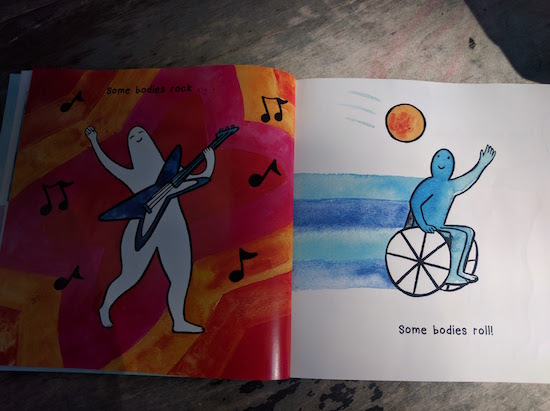
But not in our house. There came a point when I realized our eldest was listening to every word we said and then I stopped whining, “I feel fat” and “I’m ugly!” to my husband whenever I was feeling blah (and let me tell you, other than me, there is no one involved in my personal transformation who has benefitted more than my husband, who apparently doesn’t miss my insecure neediness. Who knew?). I started delivering non-sequiturs at dinner like, “Man, I sure like my freckles,” and “I think my hair looks really pretty today” (about as naturally, at first, as I might bring up topical ideas like online porn or bullying, the kinds of talks you gotta have).
The think about fake it ’til you make it though, is that it’s kind of true. In my experience, there are only so many times you can say, “I sure love how strong my arms are” or “I really like the way I look in this dress” before you start…meaning it. Before you start actually looking for things about you to like and love, because of course it’s good for your daughters, but the thing about it that you never expected is that it’s also good for you.
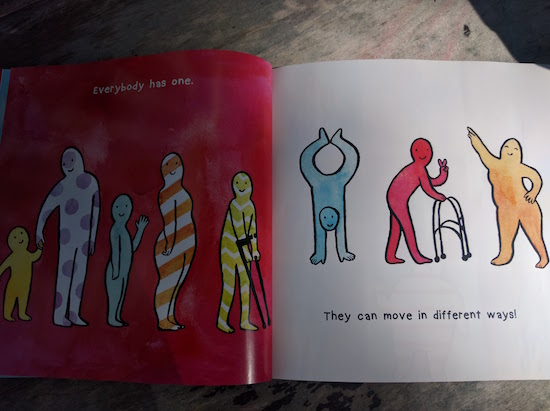
And so this is why I love Roz MacLean’s The Body Book, a simple little paperback with enormous ramifications. Because a mother is going to pick up this book for her child, and they’re both going to enjoy the story’s celebration of bodies of all kinds, shapes, sizes, and abilities: “Some bodies are round./ Some bodies are straight./ Some bodies are wavy./ All bodies are GREAT!!!” She writes about bodies that swim and play, and dance all day, and bodies that love hugs, and bodies that need space, and rocking bodies and rolling bodies, and wibbly bodies, and wobbly bodies too.
All well and good, illustrated with simple cheerful images of blobby bodies in a rainbow of colours all doing what bodies do.
The very best thing about The Body Book though, the most excellent and profound, is that every time that mother reads the book, she’s going to have to deliver the line, “I love my body. Do you love yours too?” A line that, as I’ve stated, is actually one of the bravest, most amazing things that a woman can say.
And I love that once that mother has said it enough, there is a chance she might actually mean it.
August 23, 2016
The Best Kind of People, by Zoe Whittall
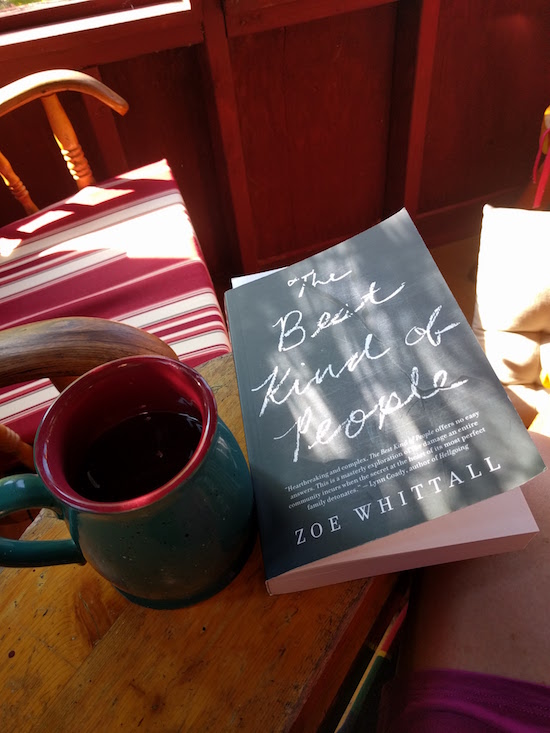
While Zoe Whittall has made a career of writing about misfits and outlaws (which is part of the title of an anthology she edited in the early 2000’s), she turns the tables in her latest novel by writing about a family of unremarkable (were it not for their resolute upstandingness) middle class people who suddenly become misfits and outlaws in their very own lives. The book is The Best Kind of People, which I read on my summer vacation and handed directly to my husband when he asked me what book he should read next. And the family is the Woodburys, the patriarch of whom shocks his wife and children and entire community when he’s accused of sexual assaulting girls at the high school where he teaches.
“How could a person do such a thing?” is the kind of question that tends to be raised after the fact, although Whittall is more interested in another question with wider ramifications, which is, “How can the people around that person, the people who love that person, who did it make sense of their lives and the world once he has?” Joan Woodbury tries to make sense of her past and her future—what was her marriage all of these years, and who is she going to become outside of the relationship that has so long defined her? She deals with threats and violence against her home and family, hears the whispers and the rumours, and knows that many people implicate her along with her husband, because as his wife, how could she not have known?
Her daughter carries many of the same burdens with her at school, and is forced to reconcile her own burgeoning sexuality with her father’s egregious crimes, not to mention falls in with a group of Men’s Rights Activists who try to use her and her father as a pawn for their cause. And when the Woodbury’s son returns home from his life in New York to take care of his family and support his father, he’s forced to confront his own difficult past as a gay boy coming of age in a small conservative town.
Similar to Joan Thomas’s novel, The Opening Sky, The Best Kind of People ponders how the politics and morality of well-meaning, liberal-minded people are tested when they find themselves in situations they never expected. In Whittall’s book, the result is a complicated range of emotions and reactions, and while she puts her characters through test after test, the result every time in believable, entirely (and sometimes unbearably) human. There is so much nuance here, but the book is also devourable, utterly gripping, unfolding with the pace of a thriller and also that hard to put down, as the case unfolds day by day and then week by week, right up until the trial.
While the entire book is fantastic, Whittall gets full points for her spectacular ending, however, which turns the story inside out and disturbingly rips us away from the singular perspectives of characters to reflect the wider culture of rape and sexual violence against whose context the entire novel has been taking place. Which is to say that this is not just a story about a family.
And then the final sentence, which will haunt you long after you’ve finally finished reading, quiet, subtle, devastating and terrible, just like the injustice that is Justice, which isn’t anything like justice at all.
August 22, 2016
Finite
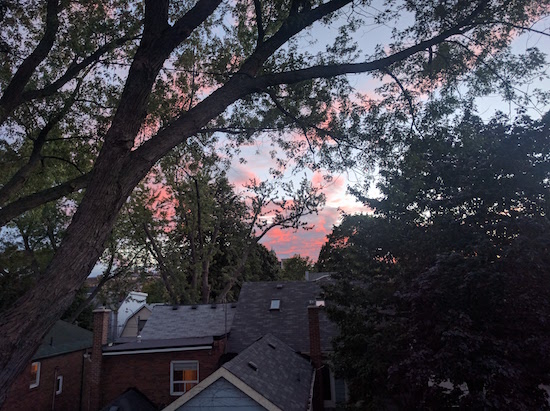
For a few weeks, I was wondering if this summer would be endless, or at least why it couldn’t be. We had a stellar run of days at the beach and road trips and memorable ice cream cones and stargazing. We’ve had a spectacular mix of GO-GO-GO and also lying around on the grass doing nothing. This summer has hung in a marvellous balance, just enough of everything we ever wanted. The children haven’t been complaining about boredom, or Harriet walking around delivering deep heaving the deep sighs which have always been her summer speciality (and a sign for me that we need to get her back to school). It has been a very good summer, the kind of summer you get when your baby is finally three and the world and the days open up their (figurative) arms so wide—I remember the same feeling during the summer of 2012 when Harriet was three, but it was only temporary as by the end of that summer I was pregnant. By the end of this summer I will not be pregnant (and in fact I will never be pregnant ever again—a fact that, I was telling Stuart the other day, makes me as giddy as the prospect of having a baby once did) but all the same, it starts winding down quite naturally. Summer was never meant to be endless, and if it was, I suppose we would tire of it. Summer winding down now with a fairly ordinary couple of weeks in the city. Harriet is in daycamp at the museum, but only for the afternoons, which means that we don’t need to bother getting out of bed until we feel like it, let alone getting dressed. Each day they’ve watched a movie while I’ve settled down to write my 1000 words. So it’s a fairly undemanding routine, but it’s still a routine, getting us set for back to school in just a few weeks time. I’ll be returning here too to let you know about wonderful books I’ve been reading—the new Louise Penny, and Zoe Whittall’s new novel, and I am reading Mister Nightingale, by Paul Bowdring, now, and it’s wonderful. Anyway, returning to real life The key to transitions like this, I think, is to like your real life, so that a return to it comes with its own rewards. Plus there is the prospect of autumn. Also, I’m semi-down with a stomach bug that has left me stuck on broth and popsicles, and when it’s all done (soon, I hope!), feeling generally well health-wise will seem like a ridiculous pleasure.
August 17, 2016
Abortion Baskin Robbins

In her essay, “When Life Gives Your Lemons,” Lindy West notes that she’d rarely think about her abortion anymore if she wasn’t driven to speak out against “zealous high school youth groupers and repulsive, birth-obsessed pastors” who win ownership of the abortion conversation by default—possibly because most other people acknowledge that abortion (and pregnancy and life in general) is messy, nuanced, intensely personal and not very well or cleverly served when batted around like a rhetorical badminton birdie. I identified with a lot of West’s essay, but not this one bit. Because the truth is that I think about my abortion all the time. It’s a matter of geography, and I can’t even help it, Abortion Baskin Robbins being case in point.
It’s a juxtaposition that amuses me, abortion with an ice cream shop. Some might be uncomfortable with the idea, but it’s the word “abortion” spoken aloud that usually troubles people, not necessarily the ice cream. Some might thing I’m being flippant, and the truth is that I actually am, and I’m still a bit high on the liberation I feel at finally being able to say that word, abortion, over and over. Even in an ice cream shop. (Can you imagine how it feels to have the point on which your adult life has hinged be an event that is meant to be literally unspeakable? Can you imagine how empowered you feel when it isn’t anymore?)
But it’s not all flippancy and irreverence—there is meaning there. This spring and summer, Abortion Baskin Robbins is where we’ve turned up as a family after my children’s Thursday night soccer games in a school playground a few blocks north. The fact is that while the last fourteen years taken me to amazing places, geographically speaking I haven’t left the neighbourhood. The sidewalks I travel in my daily life are the same ones I took when I was people I don’t even remember now, including a girl who was once so sad and relieved to obtain an abortion during the summer of 2002. So that my children’s post-soccer ice cream joint is the same place I went to with my friend immediately after my abortion all those years ago. My children order ice cream cones that turn their lips blue, and I can’t help think about the connections between my abortion and my life as a mother, which are everything. The foundations I’ve built my life upon. (Is it any wonder that I’m grateful for the freedom to design my own fate?)
It was a long time ago, distinctly not fun, and I was pretty drugged, and so it’s so surprise that I don’t remember a lot of it well. I’ve probably got some of the details wrong, and lost most of them altogether, and I cannot actually recall what it was to be the first-person protagonist of any of these events, but there are fragments to rise to the surface. The trip for ice cream for one, the advent of Abortion Baskin Robbins (although it wouldn’t be properly named for more than a decade—but what it means to be able to name these things, these pivotal landmarks in our lives). I don’t remember what I bought there, if it was a cone or a sundae or an ice cream cake. If it offered any satiation, or if it helped me feel better. I remember that my friend was with me, the friend who must have taken a day off work and travelled with me on the subway and the bus. (What an incredibly thing to do for someone—I am sure I was not sufficiently appreciative. How could I have been?) And then we went back to her house and I think we had a stack of movies, and I recall that I’d required they all be empowering feminist films. I wanted battle armour. A bunch of other friends came over and we ate indulgent snacks and watched the movies—I think that one was The Legend of Billie Jean. I was completely, unequivocally supported, and even though in my experience of accidental pregnancy I’d felt isolated and impossibly alone, after the termination I had a circle around me. It is possible that it never even occurred to me that I wouldn’t.
(“Abortion is women’s work, I guess,” writes Heidi Julavits in The Folded Clock.)
All this is on my mind because I’m reading a collection of writing about abortion, and realizing that my experience of support was not something to be taken for granted. That it makes all the difference in the world for a woman coming out the other side pretty unscathed, and not having to carry around a terrible secret shame for the rest of her days. It’s the reason why I’m able to link a medical procedure to ice cream instead of trauma. It’s why I’m able to say the word out loud now. It’s the reason I was able to get on with my life and steer it in a directly of goodness and fulfillment. I cannot even fathom what it would have been to have to go through all that alone, or ashamed. I don’t want to begin to speculate on what would have happened to me.
Update: 20 minutes after posting this, I ran into anti-abortion protestors on the street. I had five minutes to pick up my kid at daycamp, but had to stop. Again, I cannot imagine what it would be like to endure such unnecessary nonsense, to have to defend my life choices to a twenty-something twit who wouldn’t know an ovary if it punched him in the face, if I didn’t have an Abortion Baskin Robbins in my history. These people have no idea what they’re messing with. (Why do you magnify your images so much, I ask him. Because we want people to see them, he said. Doesn’t it mean something quite significant, I told him, that otherwise you’re grossly inflating the situation [quite literally] they can’t?)
August 5, 2016
Summer Break
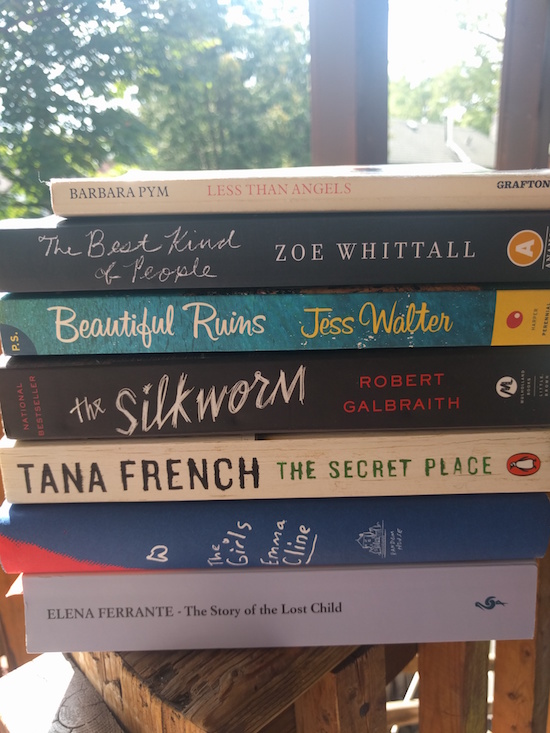
One of my favourite bits of blogging advice is that bloggers should take breaks—it’s good for the blogging soul (sole!) and also underlines to the reader that the person behind this blog is a human. And now with this post, I put my advice into practice. We’re heading offline and into the wilds tomorrow, and I can’t wait. Particularly since I’m bringing this beautiful stack of novels with me. We’ll be back to the city in a week, but my blogging break might last a week longer…but no promises on this one. If all goes well I will presumably be too bursting with good things to tell you.
August 3, 2016
Summer Reads on the Radio

I was so pleased to be on CBC Ontario Morning today talking about great summer reads, and sharing the books that so delightful occupied my July. If you missed the show, you can listen again online at 33.15 minutes—I hope you do and take me up on some of these suggestions. This is a fine, fine stack of books.
